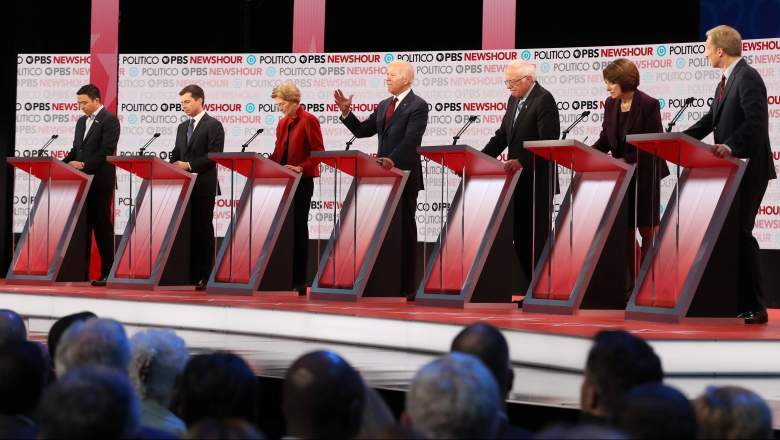
Today is the first Democratic primary, following a dramatic Iowa caucus that is still being disputed. Today’s primary will help determine who is the Democratic nominee for the 2020 Presidential election. But after today’s election is over, when is the next one? This time, we have a slightly longer break. The next election is the Nevada Caucus on February 22, 2020.
Nevada’s Caucus Is February 22
The Nevada Democratic Caucus will be on Saturday, February 22, 2020.
According to The Green Papers, anyone who will be at least 18 on November 3 is eligible to vote on February 22. They must be a registered Democrat to vote, but registration or party changes can happen on caucus day.
Delegates will be awarded proportionally. Voting begins at 12 p.m. PST, and just like in Iowa, non-viable supporters can realign to another candidate after the first round of voting. Viability is determined by the precinct’s size. If a precinct has four or more delegates, then viability starts at 15 percent. It’s 16.6 percent for three delegates, 25 percent for two delegates, and 50 percent for precincts with just one delegate.
As in Iowa, there are only two votes: first presidential preference and second. Nevada has a total of 48 delegates, with 23 being allocated according to the caucus vote percentages. Then 13 delegates are allocated based on the State Convention delegates’ support, including eight at-large national convention delegates and five pledged PLEOs.
County conventions are on April 18 and the Nevada State Democratic Convention is on May 30.
Twelve National Convention delegates are unpledged PLEOs (superdelegates) which include five DNC members, five Congress members (two Senators and three Representatives), the governor, and a distinguished party leader (this time, former Senate Majority Leader Harry Mason Reid), the Green Papers explained.
Nevada Says It Won’t Be Using the Shadow App that Iowa Used
Nevada State Democratic Party volunteers said their version of the Shadow app encountered problems when they were beta testing it, Vice reported. Volunteers encountered an error when they tried to submit caucus results. According to Vice, the Shadow app was supposed to be used for sharing early vote totals but it wasn’t supposed to tabulate final results.
The Nevada Democratic Party has since said that it won’t be using the Shadow app to report results of its caucus on February 22, although it had previously planned to do so, NBC News reported. Chair William McCurdy II said in a statement: “NV Dems can confidently say that what happened in the Iowa caucus last night will not happen in Nevada on February 22nd. We will not be employing the same app or vendor used in the Iowa caucus.”
It’s not clear what app they will be using.
The Rest of the Primary & Caucus Schedule
South Carolina’s primary is February 29 (only for Democrats.)
On Super Tuesday on March 3, 15 states will host their primaries and caucuses, including California and Texas. This year, California has moved up its primary from when it usually is held in June, making Super Tuesday an even bigger deal. Here are the states participating in Super Tuesday:
- Alabama
- American Samoa (Democratic caucus only)
- Arkansas
- California
- Colorado
- Democrats Abroad
- Maine
- Massachusetts
- Minnesota
- North Carolina
- Oklahoma
- Tennessee
- Texas
- Utah
- Vermont
- Virginia
On March 8, Puerto Rico will host its Republican primary.
On March 10, primaries and caucuses will be in Idaho, Michigan, Mississippi, Missouri, North Dakota (Democrat only), and Washington.
On March 12, the Virgin Islands will have its Republican caucus.
On March 14, Guam (Republican only), Northern Mariana, and Wyoming (Republican convention) will be held.
On March 17, primaries will be in Florida, Illinois, Ohio, and Northern Mariana (caucus). Arizona will also have a Democratic primary, but the Republican primary was canceled.
On March 24, American Samoa (Republican caucus only) and Georgia’s will take place.
On March 27, North Dakota will host its Republican convention.
On March 29, Puerto Rico will host its primary (Democratic only.)
270 To Win notes that by the end of March, more than 50 percent of the Democratic party’s delegates will already be decided.
On April 4, primaries will be held in Louisiana, Wyoming (Democratic caucus only), Alaska and Hawaii. (Alaska and Hawaii opted out of their Republican primaries.)
On April 7, Wisconsin will host a primary.
On April 28, primaries will be held in Connecticut, Delaware, Maryland, Pennsylvania, Rhode Island and New York.
On May 2, primaries will be in Guam and Kansas.
On May 5, Indiana will have its primary.
On May 12, Nebraska and West Virginia will have their primaries.
On May 19, Kentucky and Oregon will have their primaries.
On June 2, Montana, New Jersey, New Mexico, South Dakota and Washington D.C. will have their primaries.
On June 6, the U.S. Virgin Islands will have its Democratic caucus.
The Democratic National Convention will take place July 13-16. According to Ballotpedia, there will be 4,750 delegates total, including 3,979 pledged and 771 automatic (more commonly known as superdelegates.) In order to not have a contested convention, a candidate needs 1,991 pledged delegates on the first ballot. (Superdelegates aren’t allowed to vote on the first ballot.) If no candidate gets this majority of pledged delegates, then a second ballot (or more) will take place and both pledged and automatic delegates can vote this time. From then on, a candidate needs the majority of all delegates to win, which is more than 2,375 votes.